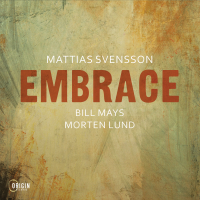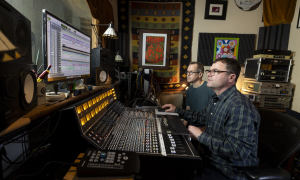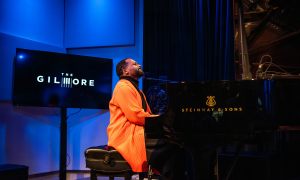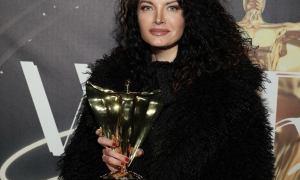
Jazz fans tend to be highly partial. We insist that one trumpeter is better than all others or that one drummer is faster, stronger or more rhythmic than everyone else. We take music personally and like to fight for our particular tastes and choices. This king-of-the-hill view also tends to spill over into the kinds of music we listen to—and what we write off. I would argue this way of thinking isn't a good thing, since it prevents a wealth of new material from reaching our ears. [Photo by Clay Patrick McBride]
The Robert Glasper Experiment: Black Radio is an important album that features an emerging jazz style. We shouldn't say, “Oh, it doesn't sound like the kind of jazz I'm used to, therefore it's not worthwhile." Or “This pianist or that pianist is better." Think of this album as Koko or Bernie's Tune or Bags' Groove or Giant Steps or Bitches Brew. It's the start of something new that may or may not develop. But it's different and eclectic and tremendously exciting once you let it in.
In Part 2 of my two-part conversation with Robert, the jazz pianist talks about recording Black Radio, and he recommends five albums that deeply influenced his experimental approach...
JazzWax: Do you add your acoustic or Fender Rhodes piano before or after a vocal is recorded?
Robert Glasper: It depends. For example, on The Consequences of Jealousy, I laid Rhodes [tracks] first and then afterward went on top of it with acoustic piano. Sometimes I choose a song specifically because I want to play Rhodes. But then after it's over, I hear acoustic piano sprinkles in my mind and go back in and play piano over the track.
JW: Like on Afro Blue?
RG: Yes. This happened after Erykah [Badu] laid her vocal [down]. The band had already recorded the instrumental tracks. Erykah did her vocals later because she was on tour so she couldn't come to the studio when we recorded. At any rate, we came in and laid the track first with just Rhodes. Then I got with her in New York at the studio. She laid [down] her vocal, and after she finished I laid the piano part to compliment her vocal.
JW: It must be fascinating to accompany a mood after the fact.
RG: It is. I didn't want to force my piano into the track. I just wanted it to be musically honest with what I thought should be there. I think musical honesty touches people more than something that is over-processed.
JW: Which is hard, since it's easy to get lost in electronica today.
RG: I wanted to mimic the kind of feeling of Michael Jackson's Off the Wall.
JW: Really? How so?
RG: He went into the studio, and they recorded all 12 songs with the same instrumentation. It sounds produced by one person. It sounds like one complete thought. One single vibe. That's why I wanted my piano's voice running through Black Radio—sometimes up top and other times in the background. It's always there. I play [synthesized] keyboard on only one track. Other than that, I wanted to keep an acoustic-Rhodes backbone running through.
JW: Why?
RG: It's a constant that gives the album a unified feel. It keeps the concept grounded and gives the album a jazzesthetic. If you remove the acoustic piano, the album becomes a whole other thing, you know? Everything has a color, and when you use colors correctly, you paint a good picture.
JW: What do you love about the late-night soul chill sound of the '70s?
RG: Maybe part of it is nostalgia and the feeling that comes from that. My mother played all of those records when I was growing up. But I've also always loved live music. My mom would take me to all of her [singing] gigs. I was always around live music and instruments. I didn't know the whole “produced" thing. I'm a child of live music. That's where my sound comes from. That's all I know.
JW: Why is hip-hop so important?
RG: Because it's the widest platform for a musician. It has the biggest audience, as far as today's young generation is concerned.
JW: But that's a commercial answer. Is it artistically significant?
RG: Totally. It's important because of that artistry. If you do the wrong thing with hip-hop, you can totally influence people the wrong way. But if you do the right thing, you influence people in a good way. Hip-hop is so huge and it's so admired. It's our jazz.
JW: How so?
RG: Jazz was hip-hop in its day. It was new, cutting-edge music. It addressed social issues, issues relating to injustice and problems of the time. Jazz was a reflection of its times in earlier generations. Hip-hop talks about those issues today, just differently.
JW: Esthetically, what's special about it?
RG: From an artist's standpoint, there are different forms of hip-hop. It's not all the same, just as jazz is different. Hip-hop has gone through different eras, just like jazz. Some of it I like. Some I don't like.
JW: What kind do you like?
RG: For me, I like the melodic side of hip-hop. I like hip hop that samples jazz cats like Ahmad Jamal, Bill Evans and Ron Carter. I like groups like A Tribe Called Quest and artists like Pete Rock. They're very melodic cats. It's also musical, with nice warm chords. But with a rocking hip-hop beat, you know what I'm saying? It's a good feeling for me. Which is what I try to mimic when I play in my piano trio. I try to mimic that sound and that feeling. To me that's my generation, that's younger soul music. That's Earth Wind & Fire.
JW: Which five albums are favorites of yours and heavily influenced your direction on Black Radio?
RG: Off the top of my head? OK, here goes:
Michael Jackson—Off the Wall (1979). For the sound and cohesiveness, the live instrumentation, the vibe, the songs and the Rhodes.
Herbie Hancock—Thrust (1974). Herbie to me was the'70s. His Head Hunters (1973) was important, too.
Roy Ayers—Everybody Loves the Sunshine (1976). It put Roy on the mainstream map. But all of his albums have something to say.
Freddie Hubbard—Red Clay (1970). For the fire.
A Tribe Called Quest—Midnight Marauders (1993). The group's The Low End Theory also is solid, but Midnight Marauders is a great place to start. Midnight Marauders, beat wise, is ridiculous. It's so musical—it's like a jazz album. There are lots of samples of artists—Mini Riperton, Joe Sample, Ron Carter and others. It's in my Top 5 favorite hip-hop albums of all time. I think any jazz fan would dig it.
JazzWax tracks: Robert Glasper's Black Radio (Blue Note)can be found at Amazon and other e-retailers.
JazzWax clip: Here's Move Love from Black Radio...
The Robert Glasper Experiment: Black Radio is an important album that features an emerging jazz style. We shouldn't say, “Oh, it doesn't sound like the kind of jazz I'm used to, therefore it's not worthwhile." Or “This pianist or that pianist is better." Think of this album as Koko or Bernie's Tune or Bags' Groove or Giant Steps or Bitches Brew. It's the start of something new that may or may not develop. But it's different and eclectic and tremendously exciting once you let it in.
In Part 2 of my two-part conversation with Robert, the jazz pianist talks about recording Black Radio, and he recommends five albums that deeply influenced his experimental approach...
JazzWax: Do you add your acoustic or Fender Rhodes piano before or after a vocal is recorded?
Robert Glasper: It depends. For example, on The Consequences of Jealousy, I laid Rhodes [tracks] first and then afterward went on top of it with acoustic piano. Sometimes I choose a song specifically because I want to play Rhodes. But then after it's over, I hear acoustic piano sprinkles in my mind and go back in and play piano over the track.
JW: Like on Afro Blue?
RG: Yes. This happened after Erykah [Badu] laid her vocal [down]. The band had already recorded the instrumental tracks. Erykah did her vocals later because she was on tour so she couldn't come to the studio when we recorded. At any rate, we came in and laid the track first with just Rhodes. Then I got with her in New York at the studio. She laid [down] her vocal, and after she finished I laid the piano part to compliment her vocal.
JW: It must be fascinating to accompany a mood after the fact.
RG: It is. I didn't want to force my piano into the track. I just wanted it to be musically honest with what I thought should be there. I think musical honesty touches people more than something that is over-processed.
JW: Which is hard, since it's easy to get lost in electronica today.
RG: I wanted to mimic the kind of feeling of Michael Jackson's Off the Wall.
JW: Really? How so?
RG: He went into the studio, and they recorded all 12 songs with the same instrumentation. It sounds produced by one person. It sounds like one complete thought. One single vibe. That's why I wanted my piano's voice running through Black Radio—sometimes up top and other times in the background. It's always there. I play [synthesized] keyboard on only one track. Other than that, I wanted to keep an acoustic-Rhodes backbone running through.
JW: Why?
RG: It's a constant that gives the album a unified feel. It keeps the concept grounded and gives the album a jazzesthetic. If you remove the acoustic piano, the album becomes a whole other thing, you know? Everything has a color, and when you use colors correctly, you paint a good picture.
JW: What do you love about the late-night soul chill sound of the '70s?
RG: Maybe part of it is nostalgia and the feeling that comes from that. My mother played all of those records when I was growing up. But I've also always loved live music. My mom would take me to all of her [singing] gigs. I was always around live music and instruments. I didn't know the whole “produced" thing. I'm a child of live music. That's where my sound comes from. That's all I know.
JW: Why is hip-hop so important?
RG: Because it's the widest platform for a musician. It has the biggest audience, as far as today's young generation is concerned.
JW: But that's a commercial answer. Is it artistically significant?
RG: Totally. It's important because of that artistry. If you do the wrong thing with hip-hop, you can totally influence people the wrong way. But if you do the right thing, you influence people in a good way. Hip-hop is so huge and it's so admired. It's our jazz.
JW: How so?
RG: Jazz was hip-hop in its day. It was new, cutting-edge music. It addressed social issues, issues relating to injustice and problems of the time. Jazz was a reflection of its times in earlier generations. Hip-hop talks about those issues today, just differently.
JW: Esthetically, what's special about it?
RG: From an artist's standpoint, there are different forms of hip-hop. It's not all the same, just as jazz is different. Hip-hop has gone through different eras, just like jazz. Some of it I like. Some I don't like.
JW: What kind do you like?
RG: For me, I like the melodic side of hip-hop. I like hip hop that samples jazz cats like Ahmad Jamal, Bill Evans and Ron Carter. I like groups like A Tribe Called Quest and artists like Pete Rock. They're very melodic cats. It's also musical, with nice warm chords. But with a rocking hip-hop beat, you know what I'm saying? It's a good feeling for me. Which is what I try to mimic when I play in my piano trio. I try to mimic that sound and that feeling. To me that's my generation, that's younger soul music. That's Earth Wind & Fire.
JW: Which five albums are favorites of yours and heavily influenced your direction on Black Radio?
RG: Off the top of my head? OK, here goes:
Michael Jackson—Off the Wall (1979). For the sound and cohesiveness, the live instrumentation, the vibe, the songs and the Rhodes.
Herbie Hancock—Thrust (1974). Herbie to me was the'70s. His Head Hunters (1973) was important, too.
Roy Ayers—Everybody Loves the Sunshine (1976). It put Roy on the mainstream map. But all of his albums have something to say.
Freddie Hubbard—Red Clay (1970). For the fire.
A Tribe Called Quest—Midnight Marauders (1993). The group's The Low End Theory also is solid, but Midnight Marauders is a great place to start. Midnight Marauders, beat wise, is ridiculous. It's so musical—it's like a jazz album. There are lots of samples of artists—Mini Riperton, Joe Sample, Ron Carter and others. It's in my Top 5 favorite hip-hop albums of all time. I think any jazz fan would dig it.
JazzWax tracks: Robert Glasper's Black Radio (Blue Note)can be found at Amazon and other e-retailers.
JazzWax clip: Here's Move Love from Black Radio...
This story appears courtesy of JazzWax by Marc Myers.
Copyright © 2026. All rights reserved.























